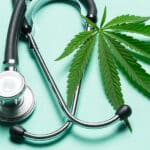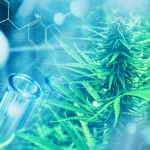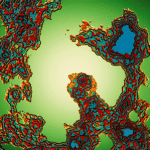Oral health is an essential part of overall hygiene and well-being. Poor oral hygiene can lead to cavities, gum disease, and gum infection, which, if left untreated, can lead to systemic inflammation. Recently, a number of dental products containing cannabidiol (CBD) and other plant cannabinoids have been introduced to the marketplace. While we’ve seen plenty of outlandish products of dubious benefit (such as CBD-infused pillows and sportswear) come to market lately, CBD products may actually have a promising future in oral health.
When one talks about cannabis therapeutics, oral health has not generally been a topic that figures in the discussion. But recent data suggests that cannabinoids could become a staple in the dental field in the years ahead. Several toothpaste manufacturers have taken note of research showing that CBD and other plant cannabinoids have antimicrobial properties relevant to dental care.1 Colgate has already purchased a company that produces CBD infused toothpastes and mouthwashes.
Better Than Colgate
A 2020 study conducted by researchers in Belgium showed that cannabinoids were more effective in reducing the bacterial colony count in dental plaques as compared to well-established synthetic oral care products, such as Oral B and Colgate. To demonstrate this, the researchers recruited sixty healthy adults and arranged them into six different groups based on the Dutch periodontal scoring index (DPSI) representing different levels of gum health.2
Samples of plaque were collected from intradental spaces between their teeth, and the samples were then plated on two separate Petri dishes. Four divisions in the dishes were then made, and on each section, cannabinoid (12.5%) or toothpaste (undiluted) was spread/streaked on the surface of the agar plate using microbrush applicator. On Petri dish A, a combination of four plant cannabinoids – CBD, cannabichromene (CBC), cannabiniol (CBN), and cannabigerol (CBG) – were used. And on Petri dish B, cannabigerolic acid (CBGA), Oral B, Colgate, and Cannabite F (a toothpaste formulation of pomegranate and algae) were used. The resulting bacterial colony count was much higher in the Colgate, Oral B and Cannabite F treatments, whereas significantly less colony count was observed in all the cannabinoid treatments.
In a subsequent study, the same group of researchers demonstrated that cannabinoid infused mouthwashes containing CBD and CBG at <1% (that did not contain alcohol or fluoride) were as effective as 0.2% chlorhexidine mouthwashes in reducing dental plaque. This is both an intriguing and important finding since chlorhexidine mouthwashes are currently considered the gold standard in the field of dentistry for plaque reduction. This second study followed a similar design as the previous study, recruiting 72 healthy adults and placing them in different groups based on their DPSI scores and subsequently harvesting and plating plaques from intradental spaces in each patient. Zones of microbial inhibition were measured to compare the efficacy of each product.3
Based on these findings, it appears that cannabinoid formulations produce desirable results, perhaps even more so than traditional chlorhexidine mouthwashes, which have a propensity to stain teeth when used with regularity.
A Caveat
By highlighting the potential of CBD and other plant cannabinoids in the prevention of dental plaque formation, these two studies hint that the role of cannabinoids in dentistry could be vast. However, it’s important to caveat that these are preliminary in vitro studies, and in vivo studies and clinical trials are needed to fully assess the long-term safety and efficacy of CBD-infused dental hygiene products. Additionally, it is paramount that these findings be replicated by other groups, especially given that the authors of these papers have a financial stake in their findings. In particular, Stahl is a founder of CannIBite, a company involved in making cannabinoid infused dental products.
Kyle Boyar is a cannabis scientist with a background in neurobiology, microbiology, and analytical chemistry. He is currently employed as the Director of Product Science at TagLeaf and also serves as Vice Chair and Awards Committee Chair for the American Chemical Society’s Cannabis Chemistry Subdivision (CANN). Copyright, Project CBD. May not be reprinted without permission.
References
- Cannabinoids and cannabis extracts are known to possess antimicrobial properties through their olivetol core, which serves as the pharmacophore for this activity. A pharmacophore refers to the part of a compound’s molecular structure that’s responsible for a specific biological or pharmacological interaction with a trigger or target.
- Stahl V, Vasudevan K. Comparison of Efficacy of Cannabinoids versus Commercial Oral Care Products in Reducing Bacterial Content from Dental Plaque: A Preliminary Observation. Cureus. 2020 Jan 29;12(1):e6809. doi: 10.7759/cureus.6809. PMID: 32038896; PMCID: PMC6991146.
- Vasudevan, K., Stahl, V. Cannabinoids infused mouthwash products are as effective as chlorhexidine on inhibition of total-culturable bacterial content in dental plaque samples. J Cannabis Res 2, 20 (2020). https://doi.org/10.1186/s42238-020-00027-z
Recommended Readings
Cacao, a Traditional Plant Medicine for Modern Times
Scientists are investigating the health benefits of the ‘food of the gods.’
Recipe for CBD & Mānuka Antibiotic Salve
CBD and Mānuka honey are potent allies in the fight against bacterial infections.
Bug Off! A True Story About CBD & MRSA
Antibiotic-resistant infections are a growing health crisis. CBD-rich cannabis may be a potent tool in the fight.










